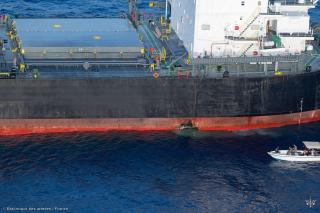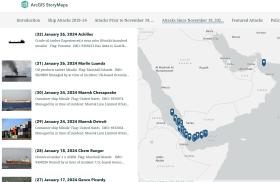
Behind Houthi Attacks on Ships Operated by Greece-Based Companies

Part of a series: Maritime Spotlight
or see Part 1: Tracking Maritime Attacks in the Middle East Since 2019
Links to Israel-linked companies, especially in light of the Rafah invasion, are again the culprit.
Main web photo obtained via the X/Twitter account of French forces stationed in the UAE and deployed in the Indian Ocean. See https://x.com/FFEAU_ALINDIEN/status/1795837694960189920.
THIS POST WAS UPDATED JUNE 3, 2024.
Since late April, the Houthis have been targeting ships owned and operated by Greece-based companies more than others. These include Marshall Islands–flagged bulk carrier Laax (IMO 9512355), which the Yemeni group attacked multiple times on May 28 in the southern Red Sea, knowing that it was signaling for Iran’s Bandar Khomeini port in the Persian Gulf. Between four and five antiship ballistic missiles (ASBMs) and one other type of projectile targeted the bulk carrier, damaging it considerably, with one seafarer reportedly suffering a head injury.
Aside from the telltale near-vertical impact of a ballistic missile at the central cargo hold, which did little more than blow out the hatch doors, given its relatively small warhead size, the large hole created right below the port side waterline near the engine room seems significantly more serious. The location of the damage indicates that it was likely caused by a radar-guided cruise missile. The Houthis operate a range of antiship cruise missiles with ranges between 120 and well beyond one thousand kilometers, and warhead sizes ranging from 150 to 200 kilograms. Therefore, when launched from inland Houthi-controlled areas with good targeting intelligence, an operational Houthi long-range radar-guided antiship cruise missile could pose a threat to commercial shipping along a roughly 800 kilometer (450 nm)-long patch of the northwestern Indian Ocean, from the Horn of Africa down to the Qatar-managed Somali Hobyo port project.
Despite the intensity of the attack, the ship was able to continue sailing. While the Laax does not have links to Israel-, U.S.-, or UK-affiliated companies and did not visit Israel recently, from the available information, other ships targeted in the past few weeks appear to be linked to a Greek company with vessels trading with Israel.
The Curious Case of Laax
The Laax was heading to Iran from Brazil’s port of Paranagua. Two shipping sources show that the bulk carrier’s beneficial owner is Greece-based Newport S.A., while the third-party operator is affiliate Greece-based Grehel Shipmanagement Company. According to TradeWinds, Newport and Grehel “currently control 19 kamsarmaxes, 10 handysizes and one ultramax on the water.” Research by the authors shows that at the time Laax was sailing to Iran, at least three other bulk carriers owned and operated by these two companies had recently called on Bandar Khomeini (unnamed so as not to endanger the seafarers).
The Laax incident is not the first in which the Houthis have targeted a vessel sailing to Iran, which supplies the Yemeni group with the weapons it uses against commercial ships and warships. On February 12, 2024, the Houthis launched two missiles against the Marshall Islands–flagged bulk carrier Star Iris (IMO 9284910) as it was sailing in the southern Red Sea heading to Bandar Khomeini with a cargo of corn loaded in Brazil. The ship sustained minor damage, as reported in the Maritime Spotlight interactive map.
The Houthis see China and Russia as non-Western powers and are willing to engage with them, and vessels linked to Chinese and Russian companies have been largely spared in the southern Red Sea and Gulf of Aden. Nevertheless, the Houthis have in the past targeted oil tankers carrying Russian cargoes bound for India and China, which are key importers of Russian oil. In addition, there was an incident in March in which a crude oil tanker linked to a China-based company came under attack. However, that appears to have been due to the use of outdated information on the vessel, which was previously affiliated with a UK-based company. (This subject will be addressed in more detail in a post next week.)
Attacks on Greek Shipping Company due to Israel Trade
On May 23, the Houthis launched a missile against Malta-flagged bulk carrier Yannis (IMO 9401910) in the southern Red Sea. According to two shipping databases, the bulk carrier’s beneficial owner is the Greece-based Thanassis Martinos group of companies, while the commercial operator is Greece-based Eastern Mediterranean Maritime Limited (EASTMED). The Houthi spokesperson justified the attack by saying the company had three vessels that visited Israel in recent weeks. While the Houthis have made unfounded claims in the past few months, at least three bulk carriers operated by EASTMED are confirmed by the authors to have visited Israel in April (they will remain unnamed so as not to endanger the seafarers).
Malta-flagged Cyclades (IMO 9799616), another bulk carrier linked to EASTMED, came under an intense attack in April similar to that launched against the Laax earlier this week. At that time, Ambrey noted that the Cyclades was targeted due to “its listed operator’s ongoing trade with Israel.” That appears to have been a reference to the ship’s link to EASTMED. Any shipping company with vessels that have recently called on Israeli ports is now a potential target for the Houthis, and future attacks might not necessarily take place only in the Red Sea or Gulf of Aden.
While the Houthis claimed on May 29 that they had attacked a number of vessels, including two bulk carriers linked to EASTMED in the Red Sea, these have not been confirmed by independent sources.
Amid the ongoing Israeli offensive operations in and around Rafah in Gaza, further Houthi attacks can be expected in the region. If a shipping company currently owns or operates vessels trading with Israel, its entire fleet will be exposed to high risks in any region within the range of antiship weapons of the Houthis and perhaps other Iranian proxy groups.
View the interactive map tracking maritime attacks.






